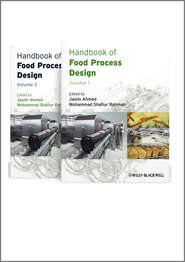
Handbook of Food Process Design, 2 Volume Set (Rahman Shafiur Mohammad)
Полная версия:
Описание книги:
In the 21st Century, processing food is no longer a simple or straightforward matter. Ongoing advances in manufacturing have placed new demands on the design and methodology of food processes. A highly interdisciplinary science, food process design draws upon the principles of chemical and mechanical engineering, microbiology, chemistry, nutrition and economics, and is of central importance to the food industry. Process design is the core of food engineering, and is concerned at its root with taking new concepts in food design and developing them through production and eventual consumption. Handbook of Food Process Design is a major new 2-volume work aimed at food engineers and the wider food industry. Comprising 46 original chapters written by a host of leading international food scientists, engineers, academics and systems specialists, the book has been developed to be the most comprehensive guide to food process design ever published. Starting from first principles, the book provides a complete account of food process designs, including heating and cooling, pasteurization, sterilization, refrigeration, drying, crystallization, extrusion, and separation. Mechanical operations including mixing, agitation, size reduction, extraction and leaching processes are fully documented. Novel process designs such as irradiation, high-pressure processing, ultrasound, ohmic heating and pulsed UV-light are also presented. Food packaging processes are considered, and chapters on food quality, safety and commercial imperatives portray the role process design in the broader context of food production and consumption.












